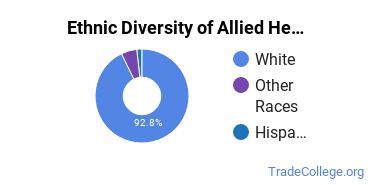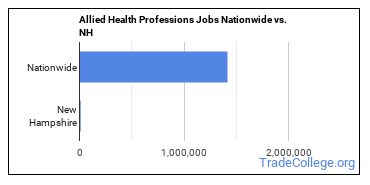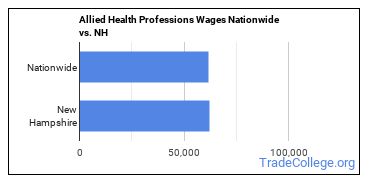Find Trade Colleges
Allied Health Professions Schools in New Hampshire
132 students earned Allied Health degrees in New Hampshire in the 2021-2022 year.
As a degree choice, Allied Health Professions is the 5th most popular major in the state.
Featured schools near , edit
Education Levels of Allied Health Professions Majors in New Hampshire
Allied Health majors in the state tend to have the following degree levels:
| Education Level | Number of Grads |
|---|---|
| Associate Degree | 78 |
| Bachelor’s Degree | 11 |
| Award Taking 1 to 2 Years | 10 |
| Award Taking 2 to 4 Years | 10 |
Gender Distribution
In New Hampshire, a allied health major is more popular with women than with men.

Racial Distribution
The racial distribution of allied health majors in New Hampshire is as follows:
- Asian: 0.8%
- Black or African American: 1.5%
- Hispanic or Latino: 3.0%
- White: 93.2%
- Non-Resident Alien: 0.0%
- Other Races: 1.5%

Jobs for Allied Health Professions Grads in New Hampshire
In this state, there are 6,060 people employed in jobs related to an allied health degree, compared to 1,414,230 nationwide.

Wages for Allied Health Professions Jobs in New Hampshire
In this state, allied health grads earn an average of $62,420. Nationwide, they make an average of $61,540.

Most Popular Allied Health Professions Programs in NH
There are 6 colleges in New Hampshire that offer allied health degrees. Learn about the most popular 6 below:
The student loan default rate of 2.00% is a good sign that graduates can afford their loan payments. A typical student attending NHTI will pay a net price of $20,268. The student to faculty ratio is 8 to 1.
The student to faculty ratio is 17 to 1. This school boasts a lower than average student loan default rate of 1.00%. Roughly six years after entering college, graduates of this school earn $52,890 a year.
This public college charges it's students an average net price of $19,881. 7 to 1 is the student to faculty ratio. The full-time teacher rate is 29%.
The student to faculty ratio is 17 to 1. This private school has an average net price of $26,408. The full-time teacher rate is 100%.
The student loan default rate of 0.90% is a good sign that graduates can afford their loan payments. The student to faculty ratio is 15 to 1. It takes the average student 4.13 years to graduate.
Of all the teachers who work at the school, 23% are considered full time. The 3.60% student loan default rate is lower than average. 11 to 1 is the student to faculty ratio.
Allied Health Professions Careers in NH
Some of the careers allied health majors go into include:
| Job Title | NH Job Growth | NH Median Salary |
|---|---|---|
| Diagnostic Medical Sonographers | 19% | $78,650 |
| Nuclear Medicine Technologists | 17% | $83,420 |
| Emergency Medical Technicians and Paramedics | 13% | $36,870 |
| Health Technologists and Technicians | 13% | $42,380 |
| Magnetic Resonance Imaging Technologists | 12% | $73,580 |
| Surgical Technologists | 11% | $50,200 |
| Cardiovascular Technologists and Technicians | 11% | $62,890 |
Related Majors in New Hampshire
Below are some popular majors in the state that are similar to allied health.
| Major | Annual Graduates in NH |
|---|---|
| Health/Medical Admin Services | 1,306 |
| Health Sciences & Services | 423 |
| Mental & Social Health Services | 100 |
| Nursing & Nursing Assistants | 71 |
| Allied Health Services | 47 |
| Bodywork & Therapeutic Services | 47 |
| Dental Support Services | 16 |
| Clinical/Medical Laboratory Science | 14 |
View all majors related to Allied Health Professions
Explore Major by State
Alabama
Arkansas
Connecticut
Florida
Idaho
Iowa
Louisiana
Massachusetts
Mississippi
Nebraska
New Jersey
North Carolina
Oklahoma
Rhode Island
Tennessee
Vermont
West Virginia
View Nationwide Allied Health Professions Report
References
More about our data sources and methodologies.




